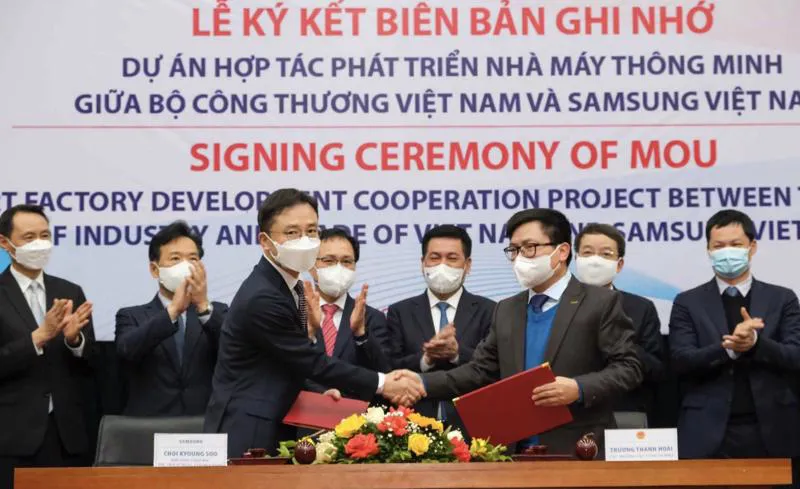Samsung assists Vietnam in smart factory development
The South Korean tech giant would support the training of 100 experts and assist 50 local companies in applying the model of the smart factory in Vietnam.
The Ministry of Industry and Trade (MoIT) on February 22 signed a cooperation agreement with Samsung Vietnam in the execution of a smart factory development project in the 2022-2023 period.
| Samsung will support Vietnam in smart factory development in the 2022-2023 period. |
“Vietnam’s participation in the project would help enhance the efficiency, corporate governance capabilities, and the status of businesses, eventually forming alliances in the digital industry sector,” stated Minister of Industry and Trade Nguyen Hong Dien at the launch.
Under the project, Samsung would support the training of 100 experts and assist 50 local companies in applying the model of smart factory to expand production capacity based on digital technologies, with the majority operating in fields of packaging, mechanical engineering, or plastic production.
“The project would help take Vietnam’s industrial sector to a new level. Trainees and companies participating in the project would be equipped with the necessary knowledge and skills to support Vietnamese businesses enhance competitiveness and further integrate into the global value chains,” he said.
A recent study suggested the application of the smart factory model would help firms reduce cost, delivery time and enhance productivity by 30%.
According to Dien, the MoIT has been working with multinationals and large-scale foreign-invested corporations in Vietnam to improve production capacity, enhance competitiveness, and the quality of workforce for enterprises in the industrial sector, especially in manufacturing, processing, and supporting industries.
The move is particularly significant, given the slow progress of digital transformation among industrial companies, Dien said, not to mention the low readiness for the 4.0 technologies application in production/business activities.
“The majority of businesses are facing barriers in terms of lacking digital workforce, capabilities, mindset, or an IT foundation,” he continued.
Meanwhile, Industry 4.0, digitalization, and the promotion of smart factories among enterprises globally have fast become an obvious trend for the future.
Dien expected the process to help businesses optimize costs and efficiency for greater resilience against economic uncertainties from the pandemic.
General Director of Samsung Vietnam Choi Joo Ho said experts from Samsung Corporation would provide hands-on instruction for companies and participants in the project, with an aim for these companies to soon become main vendors of parts and accessories for the South Korean corporation.
Choi called for the Vietnamese Government to continue providing incentive policies for local firms to boost competitiveness.












